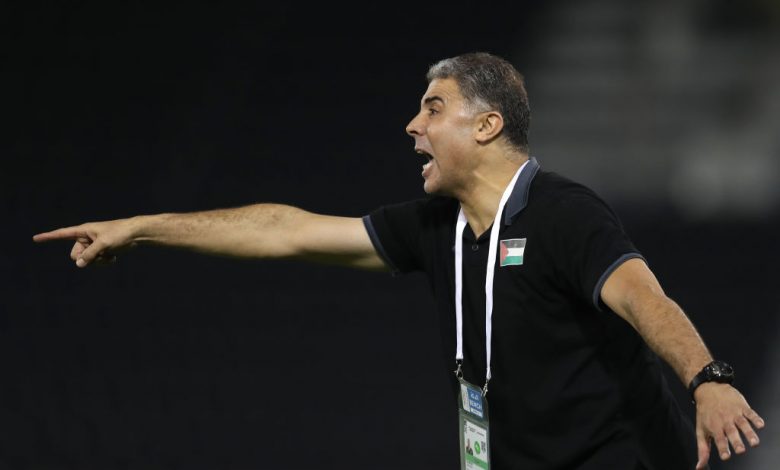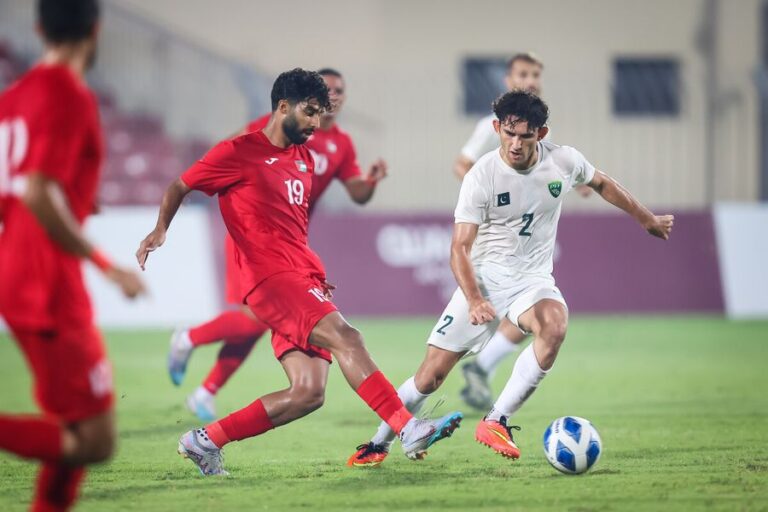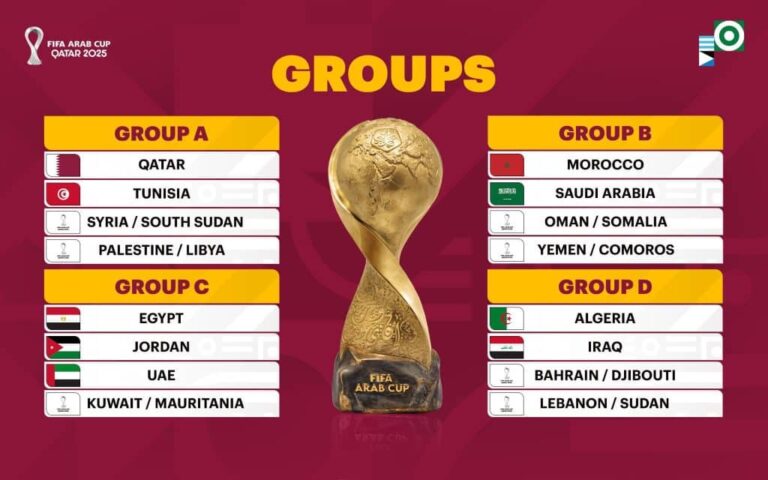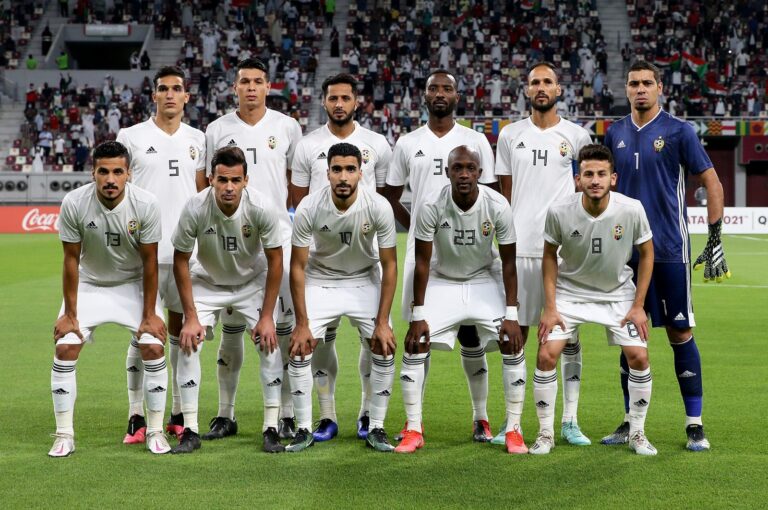In April 2021, the disastrous tenure of Noureddine Ould Ali came to an end. It took Palestine’s largest ever defeat in a competitive fixture to finally oust the former fitness coach from a position he held for three years and a record 35 matches (33 official). In that time, Palestine became known for a particularly dour style of football, perhaps best surmised by this famous sketch from the Syrian TV Show Maraya Yasser Al-Athama.
For those who want an in-depth analysis of how Palestine played under Noureddine Ould Ali, you can check out this article written at the end of 2019 and the follow up when the PFA finally decided to fire him in 2021.
The overwhelming feeling when the top job went to Makram Dabboub was one of dread and cynicism. Most followers of the national team simply did not believe that an assistant to Ould Ali could deliver a different style of play.
Dabboub however silenced all the critics by routing Singapore, Yemen, and Comoros in his first three games by a combined score of 12-1. The wins against Singapore and Yemen were especially painful as Palestine had dropped their away matches against those opponents and had they won those games would have progressed to Round 3 of World Cup qualification.
The cynics decried this as the effect of Palestine playing “weak” teams quickly forgetting the aforementioned disastrous results and the belabored wins against the likes of Nepal and Pakistan in 2018.
This begs the question- what does Palestine do differently now and how might that look once the 2023 Asian Cup finals roll around?
Forget about the Formation
You can only hope to succeed in football by understanding the game’s most critical element- space.
On paper, Makram Dabboub’s formations aren’t all that different to his predecessor’s. Let’s recall that Ould Ali’s most famous win (2-0 vs Uzbekistan) featured Rami Hamadi in goal, Battat and Jaber as full backs, Bahdari and Hamed Mayor in the middle with a midfield of Darweesh, Rashid, and Albadawi. In attack, a familiar trio of Seyam, Wadi, and Dabbagh.
Albadawi has retired, Jaber has been exiled by Jibril Rajoub, and Bahdari is pushing 40. Otherwise the personnel is the same. That same starting XI lost to Singapore.
Ask Ould Ali and he’ll say that his team played a 4-1-4-1 in defence and a 4-3-3 in attack. Makram Dabboub might say the same about his team.
So what has changed?
Well for one, the manager knows how to manipulate space effectively. Second, there is a clear idea of how the team wants to defend in order to trigger the attack. Third, the team knows what it wants to do when in possession of the ball in their own third, the midfield, as well as the opponent’s third.
Ould Ali’s sides could defend resolutely at times (two 0-0 draws at the 2019 Asian Cup prove that much) but could sometimes be a little lost when given the ball. The two infamous losses to Singapore and Yemen were a great example of that.
You can hoof a ball forward and attempt to counter a stronger side that has vacated space but what if you face a weaker opponent that wants to execute that strategy itself?
Well, you end up with Mahmoud Wadi running around by himself and defenders gleefully clearing the danger knowing full well that Wadi isn’t able to beat all four of them.
Dabboub’s sides take a direct approach and if you value a statistic like passes completed then you might think that Dabboub’s side was dominated vs. Saudi Arabia (1-1) and second best to Yemen (5-0) and Philippines (4-0).
Those passes however were ones that were ambled horizontally in search of space against a very disciplined team that held its shape resolutely.

In contrast to their opponents- Palestine almost always seeks forward passes and depends heavily on Mohammed Rashid to act as a regista. The great thing about Rashid is that he also brings a good deal of athleticism and physicality to his game which allows him to also shield his defence expertly.
When Rashid is under pressure there are several options for him. First and foremost, is the side’s captain- right back Musab Al-Battat whose marauding runs on the right flank are aided by the fact his opposite number has to track Oday Dabbagh at all times- leaving space to run into. Second he can roll it back to Yaser Hamed Mayor who has excellent technical ability and is comfortable with the ball at his feet. If that option isn’t available then there’s Rami Hamadi.
The Philippines tried to implement this strategy. They wanted Palestine stretched out wide and would try to provoke that with a lot of horizontal passing in order to send a ball through for VfL Bochum’s Gerrit Holtmann over the top or through the channels.
Whilst defending they dropped back to limit space behind them leaving two forwards to press. which meant Palestine had to rely on the long range passing of Yaser Hamed and Rami Hamadi to start play. Overall, the Philippines could only really cope with Palestine by limiting their own attacking potential. The presence of Musab Al-Battat and his cross for the opening goal sent the original game plan to the dustbin and Thomas Dooley made two changes to try and rectify problems in and out of possession.
With that teams are left in limbo. Sit back and Palestine will come at you in waves- their centre backs are fast and can cover the space left in behind and the goalkeeper is one of Asia’ preeminent keeper-sweepers.
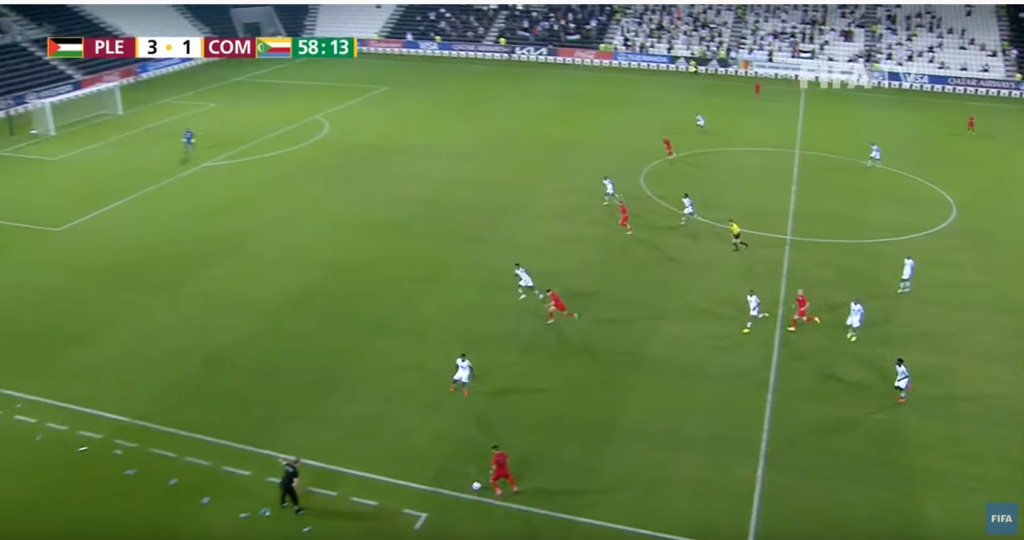
Press forward and then Palestine has you exactly where they want you. Space vacated behind the back line gives Dabbagh and Seyam two tall, strong, and fast wide forwards the opportunity to run into space or contest an aerial 1v1 against a much shorter defender.
When the formula doesn’t generate an attempt at goal it often generates a corner kick.
The Extra 30 Percent
Set pieces are another element of Makram Dabboub’s team. In the nine matches Football Palestine was able to collate statistics for (friendlies v. Kyrgyzstan and Bangladesh omitted) the team generated 55 corner kicks- scoring three of them- against Singapore, Yemen, and Philippines.
For reference, Ould Ali’s teams scored the same amount in 34 games over a three year period.
A percentage, Palestine is scoring at a rate of 5.4% way above the normal 3% scoring rate for corners. Then consider the fact that Palestine has been effective off of other set pieces too. Free kicks scored against Comoros and Yemen changed the trajectory of those games. There were also penalties won against Singapore (two) and crucially one awarded against Mongolia that proved to be the winner.
Those eight strikes account for a little more than 30 percent of the goals scored by Palestine under Makram Dabboub. The number is indicative of good work done by the coaching staff. Italy’s Euro 2020 winning squad included a former banker turned set-piece mastermind named Giovanni Vio who authored a thesis titled The Extra 30 Percent.
It was Vio’s belief that a good set piece strategy could boost a side’s goal scoring prowess by up to 30% and that is what Palestine have been able to do. Even in games when they haven’t converted- they have managed to wreak havoc from set pieces and it has a lot to do with the verticality employed by Makram Dabboub.
In fact, Palestine was perhaps at their attacking best in one of the heavy losses Dabboub gets derided for. For large stretches of the game against Jordan- Palestine were outstanding and produced a resounding 20 shots, won 9 corners, and at least a half a dozen free kicks in the attacking third. Twice the ball was in the net but ruled out for offsides. There were point blank misses- Palestine could not score but the system generated the chances.
The system also worked against Saudi Arabia in the game before that. The Saudis produced nothing in the first half and benefited greatly when Mohammed Yamin was forced off with an injury.
Point is, even in Palestine’s darkest hour, they were playing a system that caused problems and generated chances.
Challenges
First and foremost, a reactionary FA headed by the uber corrupt Jibril Rajoub refuses to do more than the bare minimum to prepare the team for the Asian Cup finals. As a result, the September window came and went with no friendlies for Palestine. The world’s best football teams are in Palestine’s backyard next month but the PFA has stood idly by as Bahrain, Jordan, Iraq, UAE, and Oman scheduled marquee friendlies against World Cup finalists before the big dance in Qatar.
Reading between the lines of Dabboub’s interview with Palestine TV following a successful qualification there is a wait and see approach within the FA. Wait for February’s draw and then start to prepare which might involve a handful of friendlies before the tournament kickoff in addition to the 2023 WAFF Championship.
A lack of friendlies feeds into Palestine’s second problem; a lack of depth. Palestine has some really good players that will be sure fire starters at Asia’s showpiece event. Rami Hamadi has recorded 20 clean sheets in 35 caps, Musab Al-Battat is a fantastic right back, the centreback pairing of Yaser Hamed and Mohammed Saleh is a solid combination of aerial prowess, speed, and technical ability. Mohammed Rashid is a great holding midfielder who can unlock defenses with pinpoint diagonal passes. Tamer Seyam and Oday Dabbagh have run riot on defenses in the past and should do so again at the Asian Cup.
Scratch past the rest of the Starting XI and Palestine looks unable to handle a rash of injuries at a single position. They do not have any experience at left back. Should two CBs get injured the solution would be to call on a 39 year old (Abdelatif Bahdari) to plug the gap. In midfield, Mohammed Yamin is the only #8 with an ability to progress the ball forward. Palestine’s current #10, Mahmoud Abu Warda is a converted winger although there’s hope that Wadi Degla’s Croatian born playmaker- Muhamed Alghoul- will join the squad soon.
Even in attack, there are no established backups to Tamer Seyam and Oday Dabbagh.
Palestine has three options at forward- Mahmoud Wadi, Shehab Qombor, and Saleh Chihadeh but only the latter has scored for the national team and he now plies his trade in the Swiss fourth division.
There is about a year to go before the next qualifying cycle begins. The Asian Cup will be played shortly thereafter meaning that there is precious little time to build on the side’s current momentum. Palestine needs to draft in more depth at centre back and goalkeeper, decide who its best left back is, and experiment with different options in attack.
If Dabboub starts answering those questions and builds a 26 man squad with the much discussed options from the diaspora then Palestine could enter the next cycle and the upcoming Asian Cup finals with the ability to challenge all rivals.

